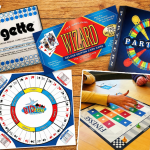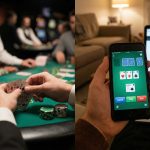Like most card games, Bridge is a social game. And, like poker, you want to have your emotions in check and your “game face” perfectly developed by the time you’re sitting down to play.
How’s Your Bridge Face?

How’s Your Bridge Face?
by Alex J Coyne © Great Bridge Links
Like most card games, Bridge is a social game. And, like poker, you want to have your emotions in check and your “game face” perfectly developed by the time you’re sitting down to play. Winning isn’t just about how well you play or how the cards are dealt; it’s about how well you know yourself and your opponents – and yet it’s often the last thing players think about. Here’s how to develop what I like to call your bridge-face…
Observe, observe, observe
Sherlock Holmes famously said, “You see, but you do not observe. The distinction is clear.” First, learn to watch the behavior of other players. Establish what’s called a baseline in their behavior before you set out to do anything else. That is to say, what’s normal behavior for them? This helps you spot anything they might do that’s “out of the ordinary” when their hand starts to go bad (or exceptionally well!) – chewing their nails, playing with their rings or tapping their fingers on the table.
Watch your tongue
There’s nothing wrong with conversation around the table, but it pays to focus on what people are saying and how they’re saying it. Are they moving away from the general small talk and instead starting to talk a little bit too much, or going entirely quiet where they were pretty chatty during the last game? In spotting someone’s tells, you want to look out for any changes from their baseline, or normal behavior.
The confidence trick
Someone who appears too confident usually isn’t, and someone who tries to obviously downplay their confidence is trying to hide something.
Fidgeting
One of the most common tells is unnecessary fidgeting. Watch what players are doing with their hands, and keep your own hands in check, too. Do they reach up and pull at their collar every now and then? Are they turning their rings over preceding a bad (or good) hand? This is another time where knowing their baseline behaviour is especially useful.
Deliberate misleading
Body language experts also look for signs of deliberate misleading. When people are trying to control their body language, it tends to show: The real emotion slips through regardless. When looking at someone’s body language to determine what’s going on in their heads, don’t just look at one tell: Especially not with more experienced players. Look at their body language as a whole. What is it telling you? Relate their body language to their hand.
Twitches
Not all behavior can be controlled. For example, I’d like you to imagine that you’re about to win. No, really – I want you to close your eyes and really imagine it. I want you to really feel triumphant: Victorious. On top of the world. Now think about what the rest of your body was doing while your mind ran with it. Did the corner of your mouth twitch? Did your hand reach up and touch your chin? It could be subtle, or it could be as obvious as a flashing sign on your forehead.
The Digital Tell
Although this article references face-to-face play for the most part, there remain tells even in online play. On BBO, for example, visual tells might be gone, but timing still speaks volumes. A long pause before a bid or play can suggest hesitation or a tricky decision, while a fast bid might indicate a familiar or automatic response. Some players develop predictable patterns—slow on defense but quick on declarer play, for example. Others may react differently when distracted or frustrated, sometimes seen in abrupt logouts or changes in chat tone. While you can’t watch their face, you can watch their timing, rhythm, and behavior across boards. These are your digital tells—just as revealing as a twitch or a sigh at the table.
It’s interesting to look at timing in terms of the history of online play. In early days on OKBridge when most of us were connecting using a modem, long hesitations between bids and play were pretty standard. A connection would be dropped just before a bid, for example, making us feel like there was a problem with the auction but 3 minutes later realizing the player was gone altogether. In 2025 however, this is rarely an issue. The biggest causes for timing irregularities these days might include the unexpected landing of a cat on a keyboard, a child at the door, or some other unexpected home invasion.
Everyone’s got a tell or two – what is yours?
Related Posts
How to Read Your Opponents (Great Bridge Links)
About the author: Alex J Coyne is a freelance journalist, author and language practitioner. Sometimes, he’s got an ace up his sleeve and a Joker in his hat. He can be found at his blog. alexcoyneofficial.wordpress.com








